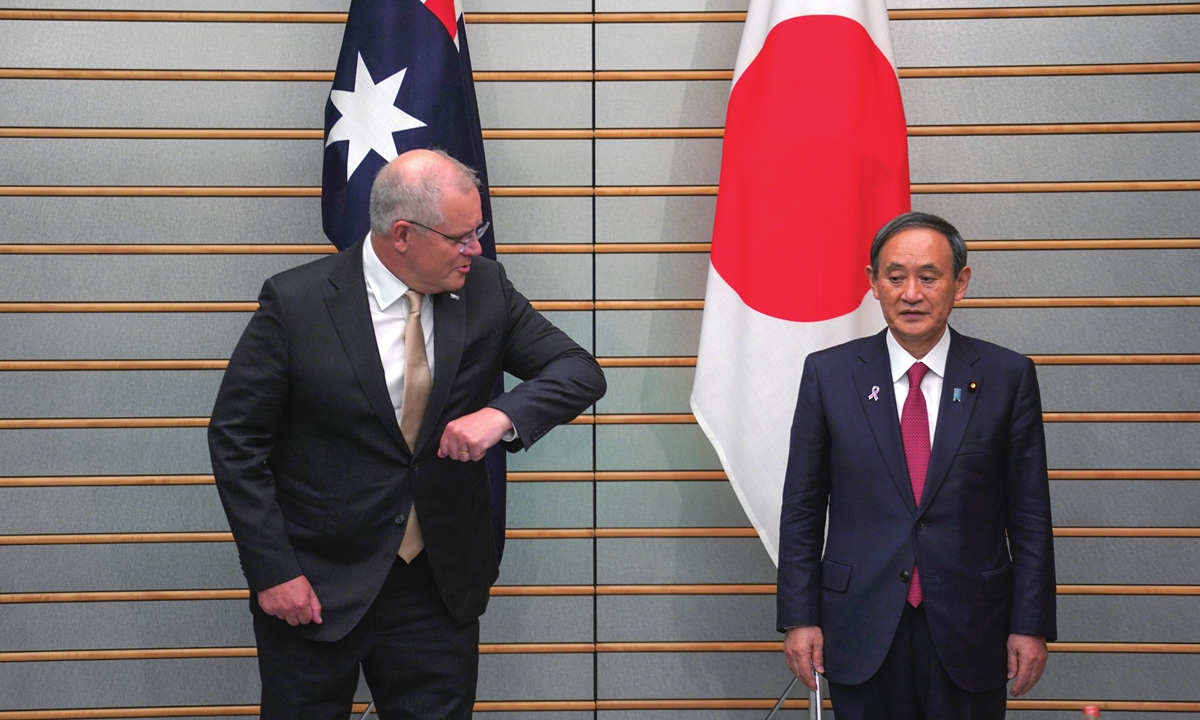Japan, Australia eye defense pact; a potential ‘Indo-Pacific NATO’ could be formed against China
By Wang Qi and Xu Keyue Source: Global Times Published: 2020/11/17 20:13:40
Potential ‘Indo-Pacific NATO’ being formed against China

Australian Prime Minister Scott Morrison (left) poses with Japanese Prime Minister Yoshihide Suga at the start of their meeting at Suga's official residence in Tokyo, Japan on Tuesday. Photo: AFP
Japan and Australia have reached a broad consensus on their bilateral defense pact as a prelude to forming an "Indo-Pacific NATO" against China, amid Australian Prime Minister Scott Morrison's two-day visit to Japan.
Chinese experts warned that the pact will harm regional stability as the two countries might lobby more regional countries to stretch their bilateral defense ties into a multilateral mechanism, under the US Indo-Pacific Strategy and Japan's strategic containment of China.
Morrison has reached an agreement with Suga on Reciprocal Access Agreement (RAA) with Japan, seeking to form a framework for the two countries' troops to conduct joint operations and training, Reuters reported. The Sydney Morning Herald said that the RAA will facilitate each nation's use of the other's military bases, which will pave the way for more military exercises, including in the South China Sea.
The RAA, whose negotiations started in 2014 and concluded in July this year, allows Japanese and Australian troops to operate in and around the two countries, Japan Times reported. Taxation, basing, entry and exit procedures, and criminal jurisdiction were also included, according to the Japanese newspaper.
If the RAA is signed and ratified by legislators in Japan and Australia, it would be Japan's first pact since it signed the Treaty of Mutual Cooperation and Security with the US in 1960 that allowed the US to station warships, fighter jets and thousands of troops in and around Japan.
Chinese analysts regard the high-level RAA as a "wind vane" in the Asia-Pacific region, even if it is less significant than the 1960 US-Japan deal.
Chen Hong, director of the Australian Studies Center at East China Normal University in Shanghai, told the Global Times that with the Trump administration's adjustment of its ties with the US allies, and the uncertainty in the White House, Australia and Japan, the US' two staunchest allies in the Asia-Pacific region, are seeking to mould their own political and security certainties - forming their own bilateral alliance within a bigger framework with the US.
On Thursday, Joe Biden told Japanese Prime Minister Yoshihide Suga on the phone that his incoming administration was committed to maintaining that close partnership, Reuters reported.
With the signing of the defense pact, Australia becomes the second closest country with Japan in the military and security partnership, said Chen, adding that with China being targeted, both countries support Washington's Indo-Pacific Strategy.
"It is not an exaggeration to say that the Japan-lead Quad is budding into an 'Indo-Pacific NATO,'" Chen said.
Da Zhigang, director of the Institute of Northeast Asian Studies at Heilongjiang Provincial Academy of Social Sciences, told the Global Times that the RAA would set a bad example for Asia-Pacific countries by hyping the so-called China threat, which will lead to uncertainty and suspicion that harms the stability and peace in the Asia-Pacific region.
Liu Jiangyong, vice dean of the Institute of Modern International Relations at Tsinghua University, told the Global Times that China has to be on alert to the two countries' likely turning a bilateral defense pact into a multi-sided quasi defense alliance by wooing Southeast Asian countries as a counter to China's growing influence in the Asia-Pacific region.
Japan and Indonesia agreed in October to speed up talks on the export of Japanese defense gear and technology to Indonesia, and planned to have their defense and foreign ministers meet to discuss China's "regional assertiveness," Reuters reported.
Vietnam also agreed to step up security cooperation with Japan in October, with Tokyo set to export defense equipment to Hanoi, the South China Morning Post reported.
The possible signing of the RAA is harmful to China, said Da. Da noted that Japan's Suga administration is sending an important signal of cooperation to China. However, there is some uncertainty over their stance.
Japan is seeking to establish air, sea and information dominance over China in the South China Sea, East China Sea and Taiwan Straits, and the battlefield of the China-Japan dispute will be the Diaoyu Islands, said Liu, who described Japan as the "sixth eye" of the Five Eyes Alliance.
Da called on China to give a diplomatic warning in response to the possible pact. He also said China should use trade as a bargain chip to protect its own national security and interests.
Fifteen countries, including China, Japan and Australia, recently signed the Regional Comprehensive Economic Partnership (RCEP), the largest trade bloc in the world.
Analysts said that the Asia-Pacific region will not easily be dragged on a "chariot" in the name of military or defense, as the just-signed RCEP reflects that regional countries' stress on economic development, and clearly know how to get along with China for mutual benefit and win-win results.
Singapore Prime Minister Lee Hsien Loong said at the Bloomberg New Economy Forum on Tuesday that "I think not very many countries would like to join basically a coalition against those who have been excluded, chief of whom will be China."
There is no need for China to be overly concerned as long as other countries do not follow Australia and Japan. China also needs to finalize negotiations over the Code of Conduct in the South China Sea with other countries as soon as possible, Da said.
Newspaper headline: Japan, Australia eye defense pact
Posted in: DIPLOMACY